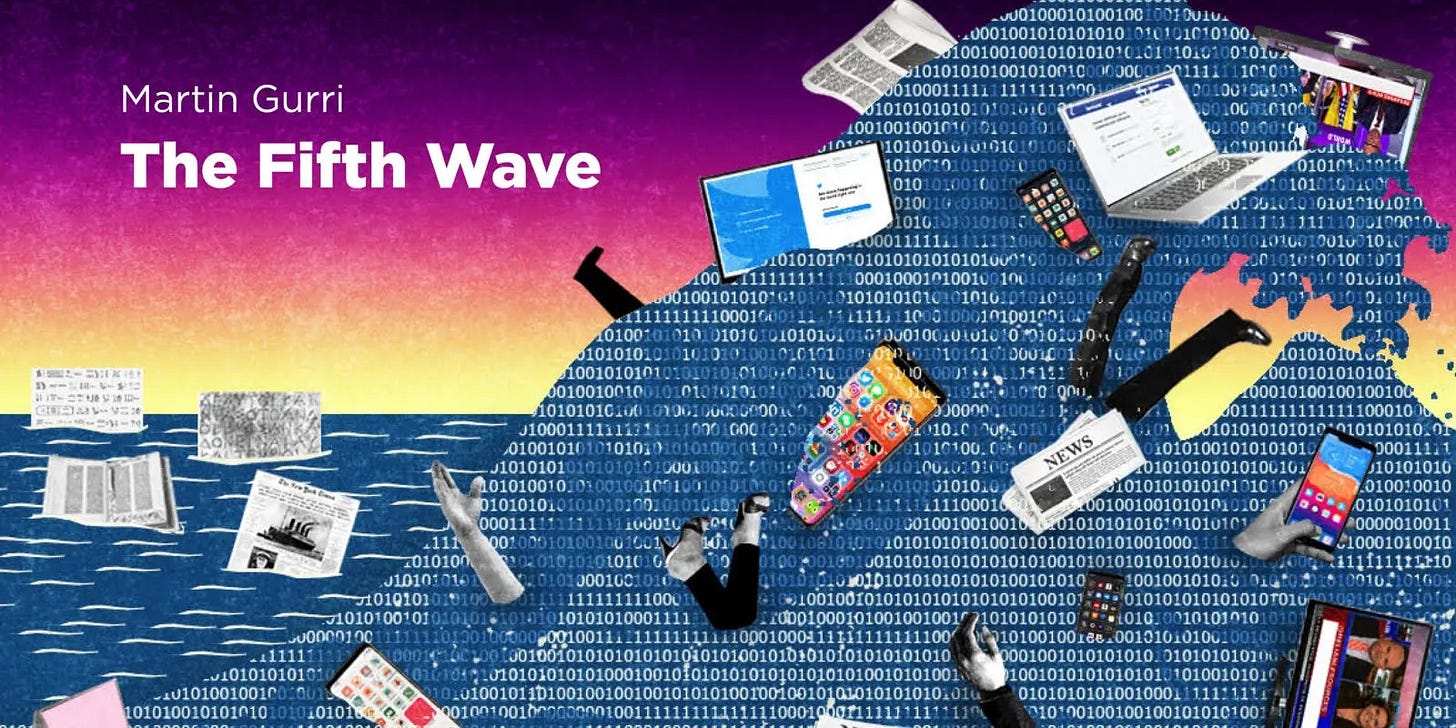Welcome to the Fifth Wave
Introducing a new monthly column from Martin Gurri that examines the impact of the ever-growing information sphere
We live in extraordinary times. The buzz from the world seems to overwhelm our capacity for understanding. What, for example, were the facts surrounding the Jan. 6 storming of the Capitol in Washington, D.C., or the urban riots that attended the Black Lives Matter protests just months earlier? Did Donald Trump steal the 2016 election with the aid of Russian agents, or did Joe Biden win the 2020 election due to fraud perpetrated by the “Deep State”—or neither, or both? Did that obscure virology lab in Wuhan, China, kill millions by somehow starting the COVID-19 pandemic?
Our confusion has an empirical underpinning. Even if you engage in intensive research on the questions posed above, you will never arrive at a conclusive answer. There are two reasons for this. First, the amount of information in the world today is, for practical purposes, infinite. You can spend a lifetime reading, listening, watching and not get to the end on any subject. Furthermore, as N. N. Taleb has observed, most information is, necessarily, noise. We are truly adrift in an ocean of confusion.
Second, we have overthrown the mediators who used to parse signal from noise for the benefit of the masses—that is to say, for most of us. Possession of authority has fractured along identity lines—social, political, racial, sexual, generational and religious. Forget the incessant wailing about the evils of polarization. When it comes to information, we aren’t really polarized—we’re pulverized. We now get to choose whom to believe. We select our own authorities, which is another way of saying we can never be certain whether we have a clue.
The structure of information sets the stage and arranges the props for the human drama at any given place and time. Information, I contend, stands upstream from culture, which in turn determines the possible forms of political and economic activity, religious worship, sexual identity, etc. Drastic changes in the flow of information will inevitably induce chaos and revolution in politics and society. That, in brief, is our present predicament.
Information hasn’t grown incrementally over time. Instead, throughout our history, changes in structure have resembled vast information pulses or waves that sweep over the human landscape, leaving nothing untouched. I can discern five such transitions in the record, each with clear sociopolitical implications.
The First Wave of Information: The invention of writing (at this point, pictographic) led to a form of government dependent on a priestly or mandarin caste—people who spent a lifetime internalizing thousands of elaborate hieroglyphs. The iconic artifacts of this era are the Egyptian temple at Karnak and the Forbidden City in Beijing.
The Second Wave: The development of the alphabet made possible the republics of the classical world, which would have been unable to function without literate citizens. Our old friend, the book, makes its first appearance, if only as a luxury commodity. The iconic artifact of this era is the great Library of Alexandria.
The Third Wave: The arrival of the printing press with moveable type may have been the most disruptive innovation of all. The Reformation and subsequent Thirty Years’ War, modern science, and the American and French Revolutions could scarcely have been possible without printed books and pamphlets. The iconic artifact is, of course, the humble Gutenberg Bible.
The Fourth Wave: I was born in the age of mass media. It was top down, monopolistic and (literally) in perpetual broadcast mode, but it absorbed millions of newly literate people, agglomerated them into a “mass audience,” and in that condition offered them a sprinkling of “news” about the world beyond their reach. This industrial model of information placed enormous power in the hands of the institutional elites—true for democracies and totalitarian systems alike. The iconic artifact is the front page of The New York Times.
The Fifth Wave: We are in the earliest stages of a colossal transformation from the industrial age to something that doesn’t even have a name yet. However, we know the distinctive feature of our brave new world: a tsunami of information that has battered the institutions that sustain modern society and the elites who control them. The iconic object is the blank Google search page.
There are 4.7 billion users on the web. Personal expression has been “emancipated,” to use Andrey Mir’s term. The volume of information produced, already unprecedented in human experience, nearly doubles every year. We will never catch up, and we keep falling further behind.
Early effects include a profound crisis of authority that has eliminated the possibility of a story being accepted by the public at large on any subject, science very much included. The mass audience has shattered into a thousand sectarian perspectives, which in turn has resulted in a constant churning of distrust, negation, anger and revolt. Truth itself is up for grabs.
How should a sane person deal with a psychotic breakdown in the information environment? A sterile approach is to divide that environment, as we once routinely did, into “new media” vs. “traditional media,” or “the internet” vs. “MSM” or mainstream media. It’s a single information sphere. It’s massively redundant and difficult for any government to deal with. During the Tahrir Square protests, Egyptian dictator Hosni Mubarak shut down the web and cell phone service but still had to contend with Al Jazeera and BBC on satellite.
The effort to understand the 21st-century information sphere will be the ongoing theme of this space. I hope to X-ray the anatomy of the monster. I’ll try to make sense of the signal and the noise. The adventure will be yours, good reader, no less than mine, since we are all tumbling together in the wake of the tsunami, and none of us can guess where the storm might land us.
Welcome to the Fifth Wave. . . .




